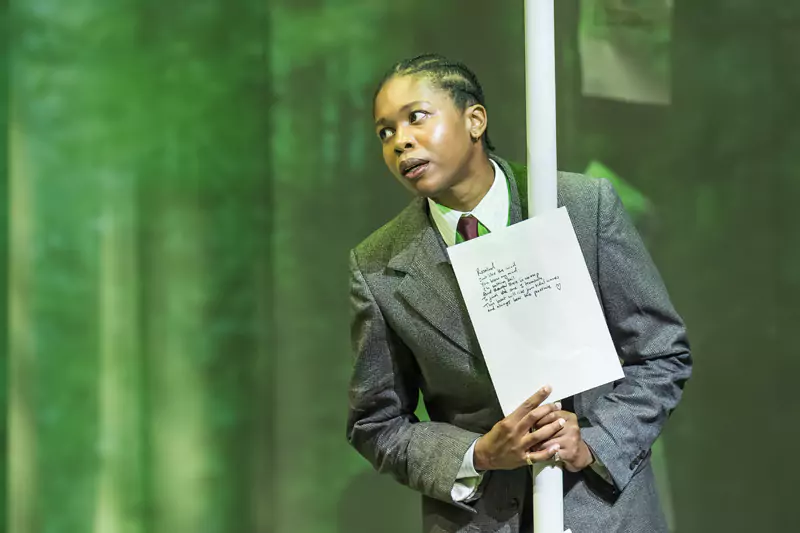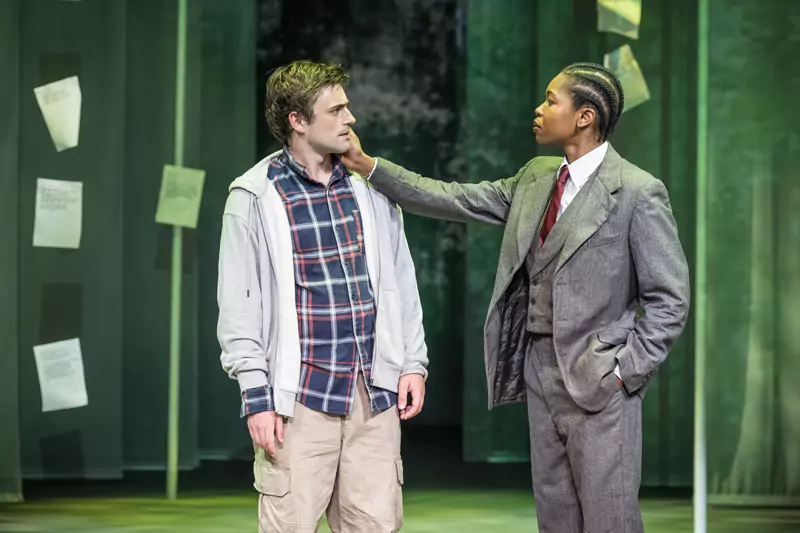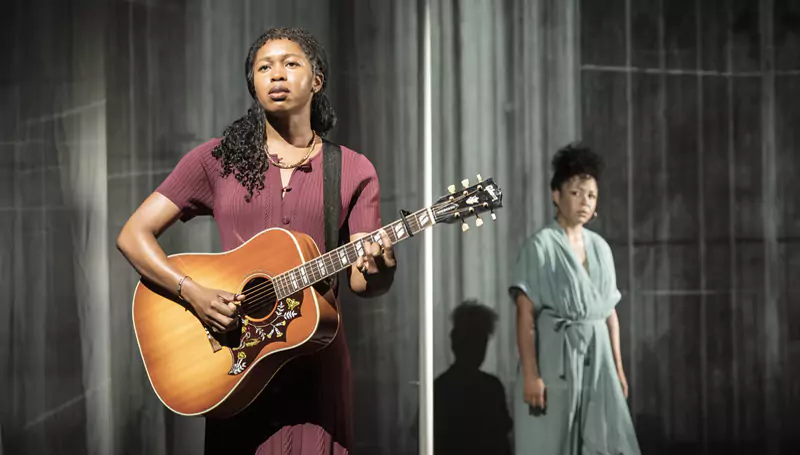“As You Like It”, Theatre Royal, Bath
Simon Thomas in South West England
22 August 2025
★★★
In Ralph Fiennes’ first production in a season of three at Bath’s Theatre Royal, Grace Pervades, there were numerous references to actress Ellen Terry’s yearnings to play Rosalind in As You Like It. Whether the connection to his next offering was intentional or not, or some kind of in-joke, he now takes on the role of director for the very same Shakespearean pastoral comedy.

Gloria Obianyo as Rosalind.
Photo credit: Marc Brenner.
What he seems to be attempting in this first flight into comedic territory is to rid the play of all tradition and cliché, a worthy enough aim, but in the process he drains it of colour and romance. Famed for his classical tragic roles, Fiennes hasn’t quite made the transition to lightheartedness and fun on stage (though he has shown glimpses of comic ability on film), and it plays more like a tragedy for much of its length. It’s not helped by a set design by Bob Crowley which, elegant enough as it is, fails to differentiate between court and forest so there’s a long trail of monochrome gloom until fairly late in the play, when some green is allowed in. It makes for a spare and dour evening.
It’s not helped by a rather charmless central couple in Gloria Obianyo and Charlie Rowe who lack chemistry or playfulness. The scenes where Rosalind, disguised as the youth Ganymede, tutors Orlando in the ways of love just don’t sparkle. The rivalry between brothers – Dukes Senior and Frederick, Orlando and Oliver – registers more freely, again a nod towards the darker elements which include themes of fraternal hatred, exclusion, and banishment.

Charlie Rowe and Gloria Obianyo.
Photo credit: Marc Brenner.
There are moments of poignancy, such as Orlando barging into the exiled court, expecting this new bucolic environment to offer savagery, only to find nothing but kindness and hospitality from the banished Duke (Patrick Robinson effectively doubling the parts of warring brothers). It’s there too in the play’s most famous speech “All the world’s a stage”, a set-piece of such power and insight that it’s almost a play within a play. It’s delivered by Harriet Walter’s Jaques with all her formidable skills and while eating an apple, a technical accomplishment in itself. It’s not clear whether she is playing the melancholy philosopher as a man or a woman (or something else) but, I dare say, that doesn’t matter in a work of such gender-swapping complexity.
Fiennes plays down the Shakespearean buffoonery, which can only be a good thing, with the tomfoolery of some of the unfunniest clowning to be found in the whole canon. Dylan Moran, in a motley shirt of coloured lozenges hidden beneath a cream suit and Tom Baker-style scarf, is a downbeat Touchstone, more a sub-Jaques thinker than full-blown zany. Fiennes doesn’t evade the oddity of the short scene with an eccentric suitor called William (Richard Pryal) who attempts to woo Audrey (Amber Grappy) under the eyes of the love-struck Touchstone. It’s such an odd little interlude but contains a certain unsettling charm. Imogen Elliott is given a pretty free rein in her brief scenes as the shepherdess Phebe and shows off some considerable comic skills in her contempt for a gormless Silvius (Ethan Thomas) and her hopeless hankering after a disguised Rosalind, but there’s a danger of upstaging whenever she’s on stage.
Other smaller roles are effectively filled. Amber James is a particularly sparky Celia, a believable cousin and companion to Obianyo’s Rosalind, and Sam Alexander is quietly impressive as both Monsieur Le Beau and the First Lord to Duke Senior’s court. Ilan Eshkeri and Tim Wheeler’s songs, delivered in folksy style by Nitai Levi’s Amiens, provide a tuneful backdrop and end the evening in a full-blown “Hey nonny-no” celebration, which feels a little forced after so much gloom.
Ralph Fiennes is undoubtedly one of the great actors of his generation and he’s not without directing experience. On film, his Coriolanus impressed and he’s even slated to direct his first opera next year, Tchaikovsky’s tragic Eugene Onegin at Paris’s Opera Garnier. As a director of comedy he needs to find a lighter touch though. Shakespeare’s comedies certainly have their murkier side but to leave out their buoyancy and romantic silliness is a mistake and makes for an under-optimized theatre experience.









